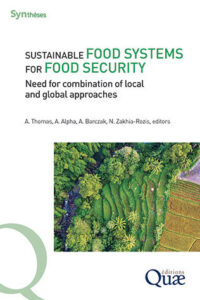Sustainable food systems for food security: need for combination of local and global approaches
Sustainable food systems for food security: need for combination of local and global approaches / Thomas, Alban, Alpha, Arlène, Barczak, Aleksandra, Zakhia-Rozis, Nadine. Versailles : Quae, 2022.

Section I – Governance of food systems
Chapter 1. Governance matters… but is it what you think?
- Analysing food security through the lens of governance
- Three perspectives on food security governance
Chapter 2. Land management, value-chain governance and food security: examples in Senegal, Morocco and France
- Limited counterbalancing governance facing agribusiness in Senegal
- Casablanca, Morocco: an emerging system of governance, as illustrated by the Ouled Hadda industrial zone
- Purchasing land for agricultural projects in France’s Île-de-France region
Section II – Linking agricultural supply with food and nutritional needs
Chapter 3. Analysing the nutrition transition through food supply and demand : cross-perspective approaches in economics, management and nutrition
- Exploring nutrition transition determinants
- Levers to reverse nutrition transition from consumption to agricultural production
Chapter 4. Shocks in agricultural production: origins and impacts on commodity prices
- Main biotic and abiotic factors responsible for production shocks
- Data-driven approaches to anticipate production shocks and assess their impact on prices
- Information transmission in agricultural commodity markets
Chapter 5. Food diets and land-use change at a global scale: the key role of modelling frameworks
- Three contrasted modelling frameworks
- Simulated scenarios
- Results
Section III – From agroecological innovations to dietary diversity
Chapter 6. Valuing the roles of women in food security through a gender lens: a cross-cutting analysis in Senegal and Nicaragua
- Reconsidering women’s contributions to household FSN
- Analytical framework of gender relations in household FSN
- Women, work and gender inequality in agriculture and food systems in Nicaragua and Senegal
Chapter 7. Agroecological innovations, food and nutrition security and food safety for small farmers: Africa-Europe perspectives
- Presentation of case studies and main results
Section IV – Innovating processing for high-quality foods
Chapter 8. Reducing food loss and waste in meat and fruit supply chains: how food engineering can help
- Objectives and approach
- Loss and waste along meat chains
- Loss and waste along fruit chains
- Smart design and application of innovative technologies to reduce FLW
Chapter 9. Artisanal palm oils: from quality design in southern Cameroon to consumption in Yaoundé
- Characteristics of processed fruits, artisanal mills and production factors in the surveyed area
- Influence of processed fruit types and process parameters on the composition and quality of artisanal red palm oil
- Supply and market practices for artisanal and industrial RPOs in Yaoundé
- Red palm oil: choice criteria, purchase strategy and consumption in Yaoundé
- Red palm oil: a main ingredient in local dishes
Section V – Agroecology to promote resilient food value chains
Chapter 10. Neither quite the same nor quite another: diversity, identity and resilience in agroecological transition
- Pasteurization, a technique for control and optimization
- Diversity of organization forms in territorial development
Chapter 11. Leveraging agroecology to improve milk production and marketing: insights from case studies in Burkina Faso, France and India
- Milk production and marketing: current trends in three contrasting regions
- Evidence of agroecology in milk production and marketing systems
- Discussion and conclusion
Section VI – Local ressources management as a driver of food security
Chapter 12. Food security and natural resources: diversification strategies
- Diversifying farming systems to improve food security in Sahelian agroforestry parklands
- Cocoa-based agroforestry in the Peruvian Amazon: does higher cultivated diversity provide better food security?
- Cereal-cowpea intercropping in sub-Saharan Africa: implications for soil fertility and food security
- Palm oil expansion and food security in Indonesia: heterogeneity and inequality effects
- Switching to more diversified and sustainable production systems in Brazil: effectiveness and permanence of REDD+ programmes
Chapter 13. Urban food waste: a resource for circular economy between cities and agriculture
- How to reduce urban food waste by considering the circular economy?
- Territorial metabolism: a method to quantify and qualify urban waste
- Recycling urban food waste through animal husbandry
Chapter 14. Market gardening for African cities: contributions, challenges and innovations towards food security
- Contribution of market gardening to food security
- Evolution of production systems and reduction of environmental impacts
- Innovation paths of market gardening